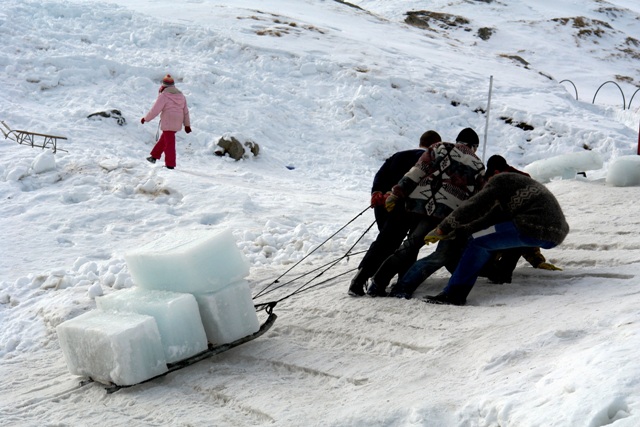
Getting to Romania’s Ice Hotel involves a hair-raising ride in a cable car to a frozen lake two thousand metres above sea level. Every December the family who run it cut blocks of ice from the frozen lake, bind them together with a mortar made of snow and water and build a small hotel that lasts until May. They also construct an ice chapel complete with a kitsch sculpture of the last supper and a frozen Jesus on the cross.
Sleeping in a room built entirely of ice is one of those experiences that everyone should try once in their lifetime. The beds consist of blocks of ice covered with wooden shipping pallets, a mattress, plenty of rugs and the all important sleeping bag. I slept so comfortably that I didn’t want to get up the following morning.
Located in the high Carpathian Mountains, Romania’s ice hotel is the only one of its kind in Eastern Europe. With just 14 rooms, no road access and less than 500 guests a year it is surely no threat to Sweden’s “Icehotel”, a mammoth operation which hosts over 50,000 guests a year. The sophisticated Swedes have an array of machinery to shift 45,000 tons of snow and ice every winter (the Romanians do it by hand), each room has original ice sculptures created by a platoon of artists and they offer snowmobile tours of Lapland.
The canny Swedes were the first to come up with the concept and they managed to get an international trademark for the name “Icehotel”, but to keep a trademark you need to prove that you are actively protecting it. The small and unprofitable Romanian operation perhaps seemed like an easy target. On December 20th last year a ‘cease and desist’ letter was sent to the Romanians saying “in view of the fact that ICE HOTEL and ICEHOTEL almost are identical there exists an obvious risk for confusion…we request that you immediately cease to use the trademark ICEHOTEL when marketing and selling your services.”
According to the legal advice website ‘Chilling Effects’ “The mere threat of a claim is often enough to cause the person receiving the threat to give up.” A typical scenario is: big company threatens small company; small company complies; the case never reaches court. But the Romanians are not complying; they have hired a top Romanian law firm to challenge the Swedes in court. The trial will take place in Bucharest later this year.
But why would a well established hotel, over 124 miles north of the Arctic Circle, feel threatened by a 14 bedroom operation on the other side of Europe? The answer lies in Britain, home to the most adventurous tourists in Europe. The Swedish ice hotel admits that 30% of their clients come from Britain, but when the Romanians tapped into this market (nabbing a few hundred Brits per year) the lawyers were called in.
Leo Klingeis, the manager of the Romanian Ice Hotel, believes “the Swedes are probably doing this because our prices are so much lower than theirs”. A quick check on the Swedish website reveals that the lowest rate for a night in Lapland is 143 Euro whereas the price in Romania is only 35 Euro a night. Multiply these prices by the numbers of guests each hotel gets reveals a vast financial difference: the Swedes earn at least 6 million Euro a year whereas the Romanians only get about 17,000 Euro – most of which will be handed over to the lawyers.
What really puzzles the Romanian side is how the Swedes managed to register an international trademark for such ordinary words. Standing on his frozen lake, Klingeis asks “how can I do any marketing if I’m not allowed to use the words ice and hotel? It’s like giving someone the trademark for Orange Juice.” Johanna Israelsson, the Swedish lawyer, wouldn’t comment when repeatedly contacted by email.
But the Romanian lawyer, Mihai Macovei, was willing to talk. He said “the trademark of the Swedish company can be successfully challenged.” This raises the question of how the Swedes were granted the trademark in the first place. Macovei believes that “it probably slipped through unchecked. Sometimes officials can be lazy.”
Meanwhile, leaving Romania’s Ice Hotel proved as challenging as getting up there. A fierce blizzard blew up the day I left and the cable car – the only form of access – had to turn back as it was being blown around by the wind. No such challenges face those going to the Swedish operation, which is located at sea level and has direct flights to Heathrow.
Rupert Wolfe Murray is a freelance editor and PR consultant based in Bucharest. He can be followed on Twitter @wolfemurray
To find out more about getting to the Ice Hotel call Leo Klingeis on 0744 971 157 or contact the UK travel agency http://www.untravelledpaths.com
Photo by James Chisnall.
Your articles are more and more interesting every time! The Romanians could change their name into Real Ice Hotel or Cheap Ice Hotel. Either way hope they win the trial. Please keep us in touch with the news.
It’s a very interesting article. I too would like to visit it. Can , we take short extracts from your article and send to some travel magazine in India. Thanks.